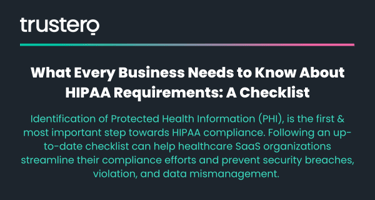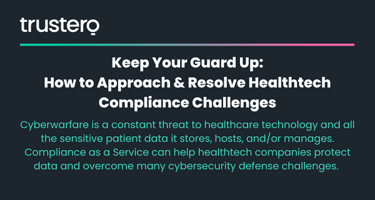What is HIPAA and what does it protect? The Health Insurance Portability and Accountability Act of...
The Real Cost of Non-Compliance: HIPAA Edition
HIPAA protects the rights of patients through regulations that prevent their sensitive information from being used without consent. This law is enforced by the Department of Health and Human Services (HHS), and it is the same department that is also responsible for issuing all the penalties and consequences that come with non-compliance.
Covered entities, businesses associates and contractors working within the healthcare industry are subject to HIPAA regulations, and the penalties for their violation. If you are reading the information in this blog, you are either a business that is required to comply with HIPAA laws, or know of one that may be violating them at some level.
HIPAA & SaaS – The correlation
The advancement of technology may have allowed us to step away from physical data logbooks and error-prone methods of data collection and storage, but it comes with its own set of consequences. Mobile usability and availability of data inherently increases the risk of unmonitored data creation and transmission. In order to avoid this, many SaaS businesses rely on cloud-based services to host and store critical patient data. With cybercrime targeted towards the healthcare industry at an all-time high, these cloud systems are constantly at risk of data breaches, theft, and security lapses.
HIPAA’s Security Rule, which applies to all SaaS businesses that have access to Protected Health Information (PHI), has clearly outlined the standards that must be implemented to protect data in this day and age for physical, as well as electronic platforms.
Bearing the Brunt
Patients seek help from caregivers and medical service providers when they are at their most vulnerable, or when they are focused on maintaining the most important asset that a human being can possess - health. To lose, misuse, or mishandle the sensitive information that patients have entrusted an organization with is unethical, and can issue a massive blow to its reputation, but the consequences don’t end there. Let’s explore the real cost of HIPAA non-compliance, and the risks that an organization exposes itself to as a result of PHI mismanagement.
Detrimental security breaches, financial losses, and a tainted reputation – How SaaS companies pay the price for HIPAA non-compliance
The Office for Civil Right (OCR) and Department of Justice (DOJ) are responsible for executing and enforcing the penalties of HIPAA non-compliance. Prior to issuing the penalties however, there is a process that must be followed:
- Thorough investigation of the complaints filed
- Conducting compliance audits and reviews
- Imparting education and performing outreach programs aimed at fostering an organization’s compliance requirements
If the data gathered from all of the above points towards security gaps and violations, the authorities take the next steps towards outlining the penalties and the course that they will follow. The OCR attempts to resolve HIPAA non-compliance cases in three different ways; obtaining voluntary compliance, issuing corrective actions, and resolution agreements. Organizations that still fail to comply will then face criminal and/or civil penalties.
Civil Penalties
Organizations that fail to resolve matters in a satisfactory manner are subject to Civil Money Penalties (CMP), which are determined based on a set penalty structure executed on the discretion of the HHS. The amount that is imposed on the non complying organization depends upon nature and degree of the violation. The three categories that it can fall into are:
- Unknowing Penalty: The range for this penalty is $100 to $50,000 per violation
- Reasonable Cause Penalty: The range for this penalty is $1000 to $50,000 per violation
- Willful Neglect (Violation corrected within required time period): This ranges from $10,000 to $50,000 per HIPAA violation
- Willful Neglect (Violation not corrected within required time period): A set amount of $50,000 per HIPAA violation
Criminal Penalties
Similar to how civil penalties are executed and issued, criminal penalties are also based off of a set tiered structure, and depend upon the nature and extent of the violation. The categories in this case are:
- Intentional possession or disclosure of health information: Individuals and organizations found in violation of this subset can be fined up to $50,000 and may face imprisonment for at least 1 year.
- Disclosure and possession under false pretenses: Employees and companies found in violation of this subset can be fined up to $100,000 and can face imprisonment of 5 years at least.
Compliance is the first step an organization can take towards building trust, an element that is crucial in attracting customers, engaging and retaining current clients, and establishing cordial relations with other businesses in the industry. Non-compliance can leave a lasting, adverse impact on the organization’s reputation, thus stunting its growth. Failing to take the right steps in protecting sensitive data, or knowingly misusing it can lead to severe financial losses, reputational damages, and most importantly, loss of trust – something that most businesses are never able to recover from.
Trustero streamlines healthcare SaaS compliance efforts
Trustero is the only Compliance as a Service (CaaS) provider that assures healthcare SaaS and tech organizations of compliance, and continuous compliance. With a contemporary, cloud-based platform powered by AI and LLM, SaaS businesses can automate and integrate their internal processes to ensure that they are fully aligned with framework regulations and standards. Trustero makes compliance easier, faster, cost-effective, and most importantly, a highly insightful experience for SaaS organizations.


